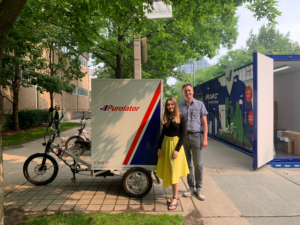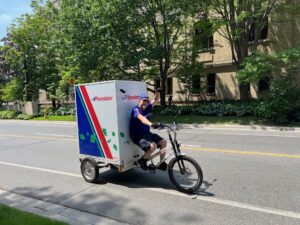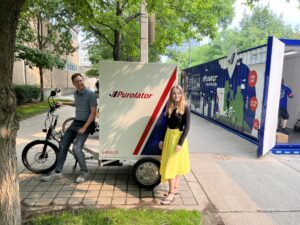Undergrad summer student research positions explored
The following is part of a series introducing CivMin’s undergraduate summer students to the Department and our greater community.
We explore the students’ projects, motivation and challenges, while providing insights into who they are, and what motivates them, beyond academia. It also highlights the multitude of ways summer research opportunities are approached and implemented under the guidance of our industry-leading CivMin professors.

From her first taste of transportation research, Lisa Guseva (CivE, Year 4) knew she wanted to pursue a career in the area. This summer, Lisa will be exploring e-cargo tricycle parking, under the supervision of Prof. Matt Roorda, Usman Ahmed (Postdoctoral Research Fellow leading the program with Purolator) and Farah Ghizzawi (PhD candidate researching commercial vehicle parking and behaviour simulation). Lisa’s work will be part of a larger project, in partnership with Purolator, examining the performance of e-cargo bikes from a business, environmental and safety perspective.
Tell us a bit about yourself.
Lisa Guseva: I’m a fourth-year Civil Engineering student pursuing a career in transportation. I’ve had the opportunity to participate in research projects for the past three summers. This summer, I am working with Prof. Roorda on the Purolator e-cargo tricycle project.
What will be your role this summer and where? What types of tasks and work will you be doing? What’s the research goal?
Lisa: I’m working with [Prof. Roorda and his team] on his Purolator project. There are three different [focuses] for my research [this summer]. The first is data querying. This involves exploring all the datasets available related to parking e-cargo tricycles, and any parking-related datasets in general. Second, I’m working on writing a literature review to be submitted for publication in a journal. My last focus is on gathering data. We’re walking around the study area and gathering parking-related datasets. This includes the distances between parking poles and Green P parking data and the tricycle’s longitude and latitude. We’re still in the process of gathering data, but I’ll be analyzing it soon.
What motivated you to work with Prof. Roorda on this project?
Lisa: In the summer following my first year, I worked with Professor Eric Miller [who focuses his research investigations within the area of transportation], and I really liked it. I decided I wanted to try a new area in transportation, and reached out to Prof. Roorda, which ended up working out. The area of transportation has been my desired career path for a while now.
What do you foresee being your greatest challenge?
Lisa: [My greatest challenge is] the literature review I’m working on. There’s not a lot of parking-related information available – it’s very specific and not a lot of studies have been done on e-cargo tricycles, especially the parking of e-cargo tricycles. And [the literature review] takes very in-depth research to write.
Have you found any favourite spots on campus?
Lisa: The Lassonde Mining Building. I usually do my work there because I like the common room. It’s also very exclusive and distraction-free.
Is there anything I haven’t asked you about you’d like to speak on? Final thoughts?
Lisa: [Some friends are I] are developing an app aimed at getting people to switch from cars to lower emission modes of transportation. We spent all last year working on it, and we’re going to continue in the fall. We’re planning to partner with local businesses in Toronto to create a point system. Whenever someone travels by walking, public transportation or cycling, they would earn a certain number of points, determined by the distance they travelled. [The points] could then be used at local stores, for example. It would drive traffic to businesses and at the same time, keep people using our app. It also compares different routes and how many emissions would be released if you used different modes of transportation.
Do you have any interesting hobbies or talents you’d like to share?
Lisa: I do trap shooting – someone throws a bunch of flying targets in the air and you shoot them, and I do 25-yard targets. I’m also on U of T’s Target Sports Student Association too.
Questions for Prof. Roorda:
What do you hope for Lisa to achieve this summer? Any major takeaways?
Prof. Roorda: Lisa is part of a larger project involving several students. We’ve been working with Purolator for about seven to eight years now. We have an electric cargo tricycle facility, installed last summer and launched in Fall 2022. E-cargo tricycles are travelling around campus and in nearby neighbourhoods delivering packages in replacement of trucks. The overarching project is to examine the performance of e-cargo tricycles from a business, environmental and safety perspective.
Lisa’s focusing on the parking element of e-cargo tricycles. This starts with exploring background literature and then involves tracking the e-cargo tricycles with GPS. I hope for Lisa to match the e-cargo tricycles GPS data with parking spot locations. That’s the data collection element of Lisa’s work. Then, she’s examining how much of a benefit these tricycles are compared to illegally parked trucks or trucks idling and blocking traffic. We’re trying to learn about how the operations work in real life. In the end, we want to develop a database where we can look at the operations of Purolator and explain the impact of parking and potential safety issues. I have high hopes for Lisa’s work.

How will Lisa be contributing to this project/your research?
Prof. Roorda: I say it’s my research but it’s really the research we do in collaboration with the City of Toronto, Purolator and others interested in this pilot study. I’m interested in it, and the City of Toronto is also interested in how well electric cargo tricycles operate on campus. We think the use of these e-cargo tricycles might expand dramatically across downtown Toronto and we could see significantly fewer trucks making deliveries. This is why Lisa and our whole team are putting significant effort into analyzing this one pilot study in-depth. We want to show evidence to the City of Toronto and companies like Purolator courier that [electric cargo tricycles] are a win-win-win solution for urban deliveries. I‘m thinking bigger picture – there’s real potential to make a significant impact in real life across the city.
How does this study last in the winter?
Prof. Roorda: My understanding is [the e-cargo tricycles] operate quite well in the winter. The batteries don’t last quite as long in the chilly weather, but they are resilient. And Toronto is not as cold as Montreal, where these tricycles are also operating over the winter – where the temperature is a lot colder and there’s a lot more snow.
Do you have any interesting hobbies or talents you’d like to share?
Prof. Roorda: I can play the piano upside down. Don’t ask me to do that in public.
